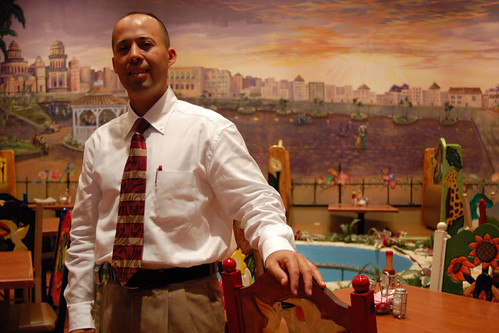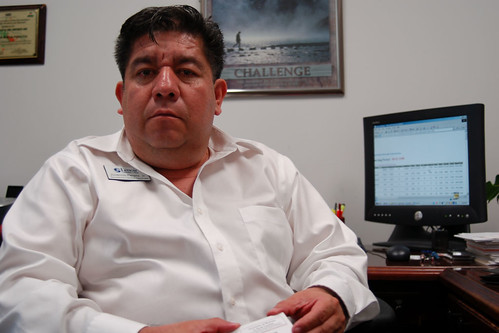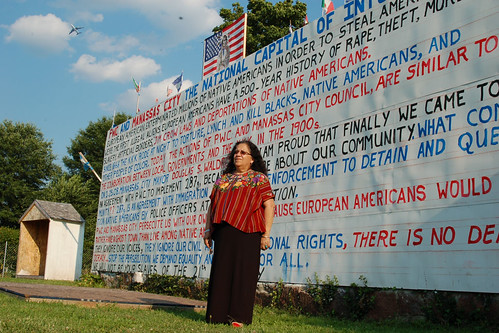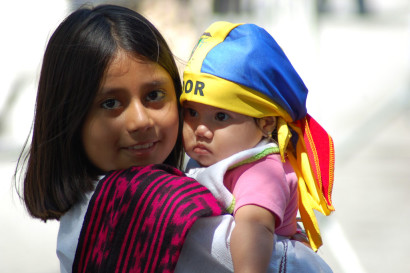A new sense of the challenges that lie ahead for Sen. Barack Obama seems to be settling in among ethnic media reporters covering the Democratic National Convention in Denver, Colorado. On Monday, just as convention delegates were starting to buzz with excitement over Michelle Obama’s scheduled prime time TV speech, reporters and columnists who work for ethnic newspapers from across the country were discovering a shared hesitancy about Obama’s candidacy in the communities they cover.
“The Barack Obama campaign started late to try to reach out to Latinos,” said Pilar Marrero, a reporter and columnist for La Opinion in Los Angeles and a Feet in Two Worlds reporter “They basically gave up the Latino vote in the primaries to Hillary Clinton…and there’s a struggle now.”
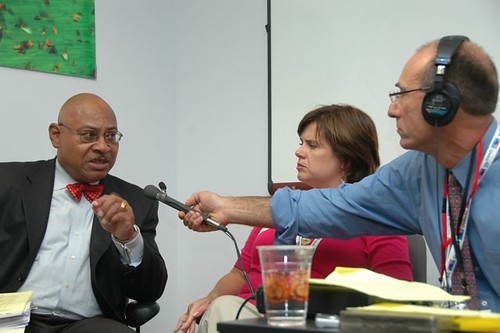
Raymond Dean Jones of the Denver Urban Spectrum and Pilar Marrero from La Opinion speak with Feet in 2 Worlds executive producer John Rudolph.
Speaking at a forum on Deconstructing the Ethnic Vote, organized by Feet in Two Worlds and the New York Community Media Alliance, Marrero said, “polls show that Latinos are thinking of voting for Obama, they’re obviously thinking about voting Democratic.” But she cautioned that enthusiasm about Obama’s candidacy is not necessarily the main motivator for many Latinos. “After a couple of electoral seasons when a specific number of Latinos went to the Republican Party – up to 40 per cent of Latinos voted for George Bush in 2004 – they are going back to the Democratic Party because they don’t like the way things are going in the country. They don’t like the immigration rhetoric, they don’t like the economy, they don’t like the war.”
Noting the overwhelming Latino support that gave Hillary Clinton a critical edge in her primary victories over Obama in Texas, California and other states, Marrero said Obama has yet to match Clinton’s popularity. “The level of support that Obama has among Latinos is still not high enough,” she said.
The challenges facing Obama among Chinese American voters are even more stark, according to Lotus Chau, Senior Reporter at Sing Tao Daily in New York. Chinese voters, “think Obama is too young, he doesn’t understand the US-Chinese relationship, and he really doesn’t understand China’s issues,” Chau said. After it became clear that Obama would be the Democratic nominee, many Chinese voters who had been enthusiastic supporters of Hillary Clinton, “switched their votes to McCain,” according to Chau.
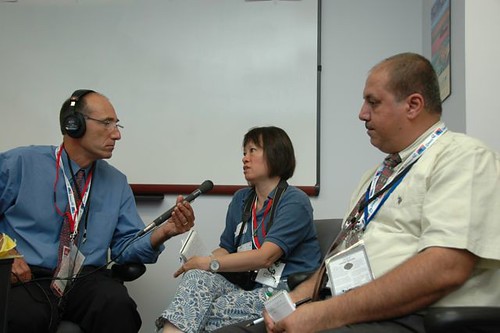
Lotus Chau of Sing Tao Daily speaking with John Rudolph. Jehangir Khattack, a freelance Pakistani journalist, looks on. Their conversation was broadcast on KGNU, independent community radio in Boulder and Denver, Colorado.
But Chau said Chinese American voters are curious about Obama. And she noted that the Obama campaign recently took steps to reach out to Asian voters including the launch of a bilingual Web site aimed at Asian Americans. “But it’s a little bit late,” Chau said, “because it just happened recently.”
Hillary Clinton’s presidential bid casts a shadow over Obama’s campaign in a number of immigrant and ethnic communities, even among African Americans. “There really is a reason why (during the primaries) the super delegates and many influential black people lined up behind Hillary,” said Raymond Dean Jones, a columnist for the Denver Urban Spectrum, a newspaper that serves people of color in the Denver area. “There was something so different about Obama that people needed to be convinced (that he was united) with the black community in America.”
Jones, who is a member of the Denver Mayor’s African American Advisory Commission, believes that black voters’ doubts about Obama during the primary season have faded as he moves into the fall campaign. Jones also points out that African Americans are very proud of Obama’s political achievements and his intelligence. Even so Jones argues Obama’s personal history – as the son of a white American mother and an African father – is an issue with some black voters. “The truth is, this is a different guy. And he’s different in many ways because he’s not like African Americans are, and people know that.”
Parts of Obama’s biography that give pause to some blacks may actually help him with Latinos, according to Pilar Marrero. “Some (Latinos) think that he’s an immigrant, but they confuse him with his father,” she observed. “And that’s good because that makes him understand the immigrant experience.” But when it comes to the question of which candidate best understands Latino voters’ concerns, Marrero believes Obama faces tough competition from Sen. John McCain . Even though, she acknowledged that, “the Republican brand is damaged among Latinos,” Marrero said “McCain’s been around, he’s pushed immigration reform. It’s really an advantage that he has.”


